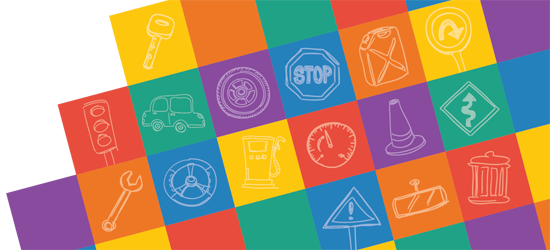
Driving tips and other life stuff
How to improve your ingenie speed feedback
Speed limits are an important part of your road safety and are there for a reason.
They're not a target - in fact, imagine a big red 'N' in front of that red circle, telling you "NO SPEEDING ABOVE THIS LIMIT".
If you’re not doing as well as you’d like in your ingenie speed feedback, these tips will help make sure you are aware of the speed limit and know how to maintain a safe speed for every journey.
Why haven't I got good messages for speed?
Autopilot
- Driving the same route a lot can mean your brain doesn't have to work as hard, so you stop being alert
- Try to stay in the gear that is appropriate for the speed limit - your car will start growling if you speed!
Distraction
- If you have people in the car it can be easy to forget to keep an eye on your speed
- The same goes for loud music or your phone beeping - always be sure you're 100% focused on the job in hand
Lack of awareness
- You could be speeding and not know it - are you always aware of the limit for every road you're on?
- You might need to revise the rules around speed limits
Why do speed limit changes matter so much?
Your brain needs to reset to the new situation
- If you're coming off the motorway, you need to pay close attention to your speed as 40mph will feel VERY slow after 70
- Sudden drops in speed should alert you to the possibility of new hazards to be alert for - a school or pedestrian crossings for example
There may be a reason you don't know about
- Speed limits are often changed due to crashes occurring in the area
- Hidden hazards - such as a farm entrance - or events that happen throughout the day might not be immediately obvious but you need a much slower speed to be prepared
- Go read our 5 biggest reasons to slow down for speed limit changes
What if I can't see a speed limit?
How to recognise a 30mph zone
- In a 30 zone there are usually regular lampposts, so that's a good way to check
- There will often be pedestrians, dog walkers, people pulling out of driveways and cyclists
- Remember: speeding in a 30 means you won’t have the right amount of time to stop for these hazards – leading to harsh braking or even a crash
How to recognise national speed limit
- In 40 and 50 zones you will see regular signs - so if you can’t you’re probably in a national speed limit zone (60mph on a single carriageway and 70mph on a dual carriageway)
- Remember: 30 zones legally only have to tell you at the beginning and end of the zone, so look for any 30mph clues before making a decision to speed up
Use other roads as a clue
- If you see a road turning off and there’s a speed limit sign very soon after the turn, that indicates a change in speed - so if you look down a street and there's a 50 sign there, play safe and go for 30 until you spot a sign
Make your own decision
- Assuming that the car in front of you is doing the right thing is dangerous
- The appropriate speed is not always right on the limit - the safe speed will always depend on lots of factors: is there traffic, is the road narrow, what’s the weather like?
What if the limit seems wrong?
Think about things that might happen on that road
- Are there events that happen over the day like school pick-up?
- Is the road prone to flooding?
- The speed limit is set for a reason so if you can’t see why the road you’re on is a certain limit, be aware that something might surprise you
If you catch yourself questioning the limit, check your speed more often
- It’s easy to speed if you’re subconsciously thinking the speed limit is unrealistic
- There could be a surprise just round the next bend that you need to be ready for - and less speed means more time to avoid a hazard
What's wrong with speeding at night if the roads are clear?
This is when you're most likely to crash
- You feel like it's safer to speed because there's no one around - but the fact that you're expecting no one to be there means you're unprepared for potential hazards
Crashes at night are worse
- We see the most severe crashes occurring at night - with the increase in people drink driving and taking risks, you need to be MORE careful at night, not less
- 22% of crashes where someone is killed or seriously injured happen between 8pm and 6am, even though there are far fewer people on the road
You're more likely to be distracted by drunk mates
- If you're the designated driver after a night out, be very clear with your friends that they are not allowed to distract you
You're more likely to be drowsy
- Driving tired is nearly as dangerous as driving drunk, so take a break immediately if you start feeling drowsy
If I don't speed I get tailgated
Don’t be bullied into speeding up
- The danger is in front of you, not from the person behind
- If you speed up and get too close to the person in front of you, the tailgater is probably going to speed up as well
- If that person in front brakes, you may go into the back of them, and the tailgater will go into the back of you
- Keep your speed low and maintain your safety bubble
- If you really feel under pressure from the driver behind, pull over safely to let them pass
- Find more advice on what to do if you get tailgated
Remember why there's a limit
- Tailgating happens most in 20 and 30mph zones - the places where speed limits are most important because they are school zones, built-up areas or rural roads
- Someone trying to pressure you into driving at an unsafe speed in an area with lots of potential hazards is not worth your time













Hey Snoopy,
Yes, I can hand on heart say I drive 20 in a 20 – I’m especially aware of my speed in a 20 because it’s so low and usually due to lots of pedestrians, schools and so on. My boss would always prefer I drove safely even if I was late!
Honor